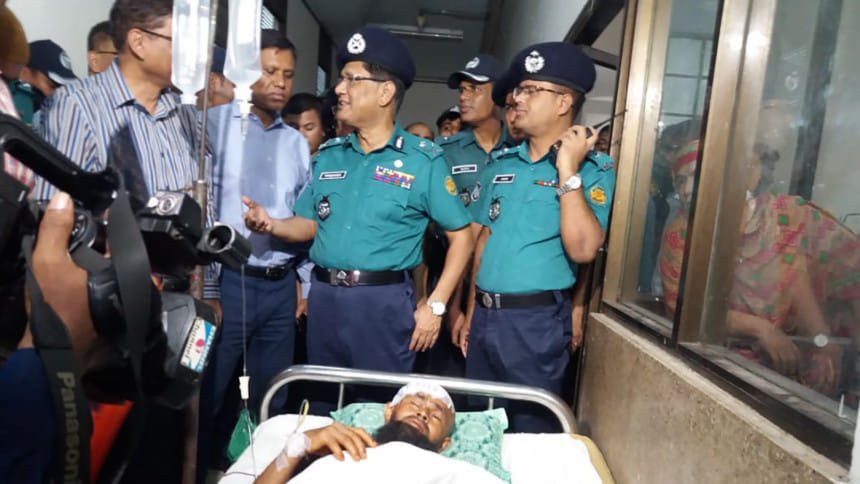It was a powerful explosive

What exploded in a police pickup in the capital’s Malibagh on Sunday was an Improvised Explosive Device (IED) and its chemicals and other ingredients were powerful. The impact, however, was comparatively less as those who made the bomb were not properly trained, according to an explosive expert.
“The IED could have caused massive damage had it been prepared with efficient hands,” an official of the Dhaka Metropolitan Police’s (DMP) Counter Terrorism and Transnational Crime (CTTC) unit said after examining the blast scene.
The official also said the bomb was similar to the one that had gone off in Gulistan last month. Both the IEDs had batteries attached to them, a technique used by militants.
However, Sunday’s bomb had a timer, splinters and a special kind of chemical, which were not there in the previous bomb, said the official, who wished not to be named.
Hours into both the explosions, SITE Intelligence Group, an American company that tracks online activity of white supremacist and jihadist organisations, said the Islamic State claimed responsibility for the attacks.
Asked if militants were involved in the blasts, DMP Commissioner Asaduzzaman Mia yesterday said, “This cannot be said right now… we have to consider both local and international aspects during the investigation.”
Sohel Rana, assistant inspector general at Police Headquarters, said, “The Malibagh incident was being investigated. The claim for the attack has come to our notice, but we’ve not yet found IS involvement in it.”
He also said the police headquarters issued some instructions in the wake of the incident.
Besides, all police units have been put on alert to take cautionary measures.
Talking about the instructions, at least two police officials said all police members were asked not to leave any of their vehicles unattended. Also, police were ordered to ensure highest level of screening at police establishments and carry out block raids, they said.
Apparently, in both the Malibagh and Gulistan incidents, police were the target. Asked about it, the DMP commissioner said, “It’s still under investigation.”
While visiting the injured from Sunday’s blast at the Dhaka Medical College Hospital yesterday, Asaduzzaman said the attack was carried out by some vested quarters to instill fear in the public.
“If we look back, we see that [Italian national] Tavella Ceasure was not a target, they just wanted to kill a foreigner to create panic…similarly the attack on the police is aimed at destroying their courage as police have been successful in combating terrorism,” he said.
Tavella was killed in Dhaka’s diplomatic zone in Gulshan on September 28, 2015.
The DMP boss also said, “… Some people of our country living abroad are now spreading various propaganda. We will investigate if they have any links with it [attacks].”
In Sunday’s attack, Assistant Sub-Inspector Rasheda Akhter Babli, 28, and two others sustained injuries. The rear side of the vehicle of the Special Branch (SB) was damaged and caught fire.
Earlier around 3:00pm, SB personnel parked the vehicle at Malibagh intersection and the vehicle was unattended.
“We’ve collected samples from the scene to determine what type of chemical was used,” said Rahmatullah Chowdhury, additional deputy commissioner (ADC) of the CTTC.
In the April 29 Gulistan explosion, two policemen and a community policeman were wounded. Explosives used in the crude bomb explosion were poor in quality, but the manufacturing technique was different from that of conventional crude bombs.
CTTC chief Monirul Islam on Sunday said they were yet to trace anyone in connection with that attack.
A number of DMP officials said a “threat” was still there and the DMP commissioner at a meeting with senior officers a couple of weeks ago alerted officials that there was intelligence about a probable attack on the police.
Yesterday the DMP chief again asked officials to remain alert and issued instructions to thwart such possible incidents, including asking officials not to keep their vehicles unattended.
At a programme last month Monirul had said, terrorist groups in Bangladesh did not have the capacity to carry out an organised attack right now.
CASE FILED OVER SUNDAY’S INCIDENT
Shafiq Chowdhury, a constable of the special branch and the driver of the vehicle, filed a case under the Explosives Substances Act with Paltan Police Station accusing unknown criminals of planting the bomb, said Shibli Noman, ADC of DMP’s Motijheel division.
In the case statement, the driver said unknown men or people hurled bombs with an intention to kill on-duty traffic policemen and damage public property.
He also claimed that he was inside the pickup when the bomb exploded.
However, witnesses said there was no one inside during the explosion. The DMP boss also said the vehicle was unattended at that time.

 For all latest news, follow The Daily Star's Google News channel.
For all latest news, follow The Daily Star's Google News channel. 




Comments